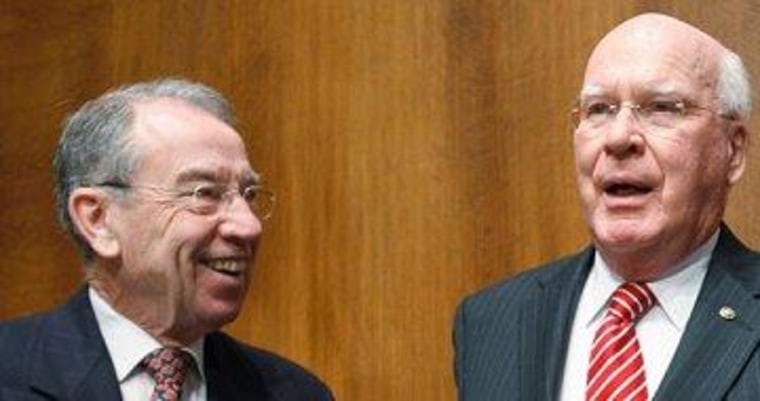The debate over how best (or whether) to pursue policies on reducing gun violence isn't limited to one idea or one bill. Indeed, even the most optimistic advocates of new legal limits will concede that given the current congressional makeup, it's hard to imagine lawmakers approving literally every proposal sought by gun-safety proponents.
But at this point, it's also a mistake to assume literally nothing on gun policy can pass. One bill, in particular, appears to be making real progress.
The Senate Judiciary Committee is set to vote Thursday on a bipartisan gun safety measure designed to curb illegal gun trafficking and purchasing.The bill, which would toughen the penalties for those who purchase a gun illegally for others to up to 15 years and make gun trafficking a felony, has attracted the most bipartisan support so far of four measures headed for the committee.The measure is a marriage of a gun-trafficking bill designed by Senator Patrick J. Leahy, Democrat of Vermont and chairman of the committee, and a similar bill that was being put together between Senators Kirsten Gillibrand, Democrat of New York, and Mark Steven Kirk, Republican of Illinois. It will be co-sponsored by Senators Susan Collins, Republican of Maine, Richard J. Durbin, Democrat of Illinois, and Richard Blumenthal, Democrat of Connecticut.
It's worth emphasizing that Sen. Chuck Grassley (R-Iowa), the ranking member on the Judiciary Committee and a NRA ally, appears to be largely on board with the bipartisan bill, which is intended to crack down on straw purchasers and illegal gun trafficking.
And while this proposal is just one part of a larger policy agenda, the fact that it's generating bipartisan backing is no small feat -- Greg Sargent yesterday called the progress on the gun-trafficking bill "the most significant movement in the debate over gun reform that we've seen since Obama first unveiled his package of proposals last December."
For proponents of new gun laws, this is the good news. Yesterday, however, brought some discouraging news, too.
A bipartisan effort to approve a universal background-check system, which would close the gun-show loophole among other things, is arguably the single most important element of the larger agenda, and enjoys the broadest and most overwhelming levels of support from the American people.
And while it looked for a while as if the pieces were in place for a bipartisan effort on this, too, at least one key Republican is beginning to balk.
With time running out for talks, Sen. Charles Schumer (D-N.Y.) remains optimistic about reaching an agreement. But gun control proponents have grown skeptical about whether Schumer's main Republican counterpart, Sen. Tom Coburn (Okla.), is acting in good faith.Schumer argues -- and gun control groups agree -- that records must be kept to ensure background checks are conducted before private transactions. Otherwise, any expansion of background checks would be unenforceable, they assert.But Coburn worries that such a paperwork requirement could lead to a national gun registry, which gun rights groups staunchly oppose, according to Senate sources familiar with the talks.
What's frustrating about this is that the concerns are rooted entirely in paranoia. There is no national gun registry; the proposal would not create a national gun registry; and as best as I can tell, no one actually wants a national gun registry. It's a fear straight out of the far-right fever swamp.
But some Republicans fear it anyway, and those concerns are apparently weighing on Coburn.
This is not to say the background-check proposal is dead, or even dying. But it is fair to say the bipartisan effort, which appeared to be steadily progressing, has hit a real snag.
President Obama has reportedly spent some time reaching out to Coburn directly -- the two have long had a good personal rapport -- but the funny thing about paranoid fears is that logic and reason can't make them go away.
